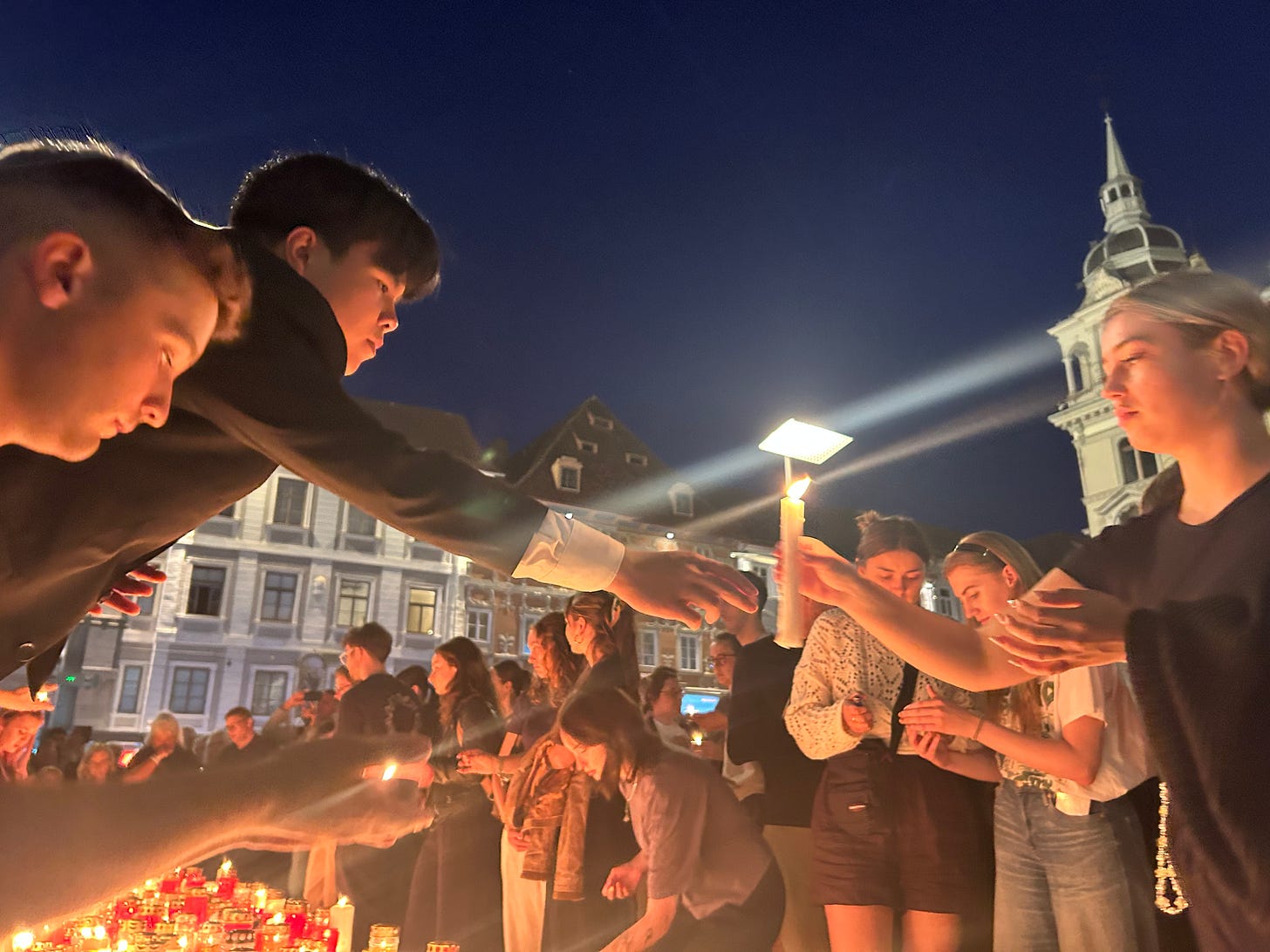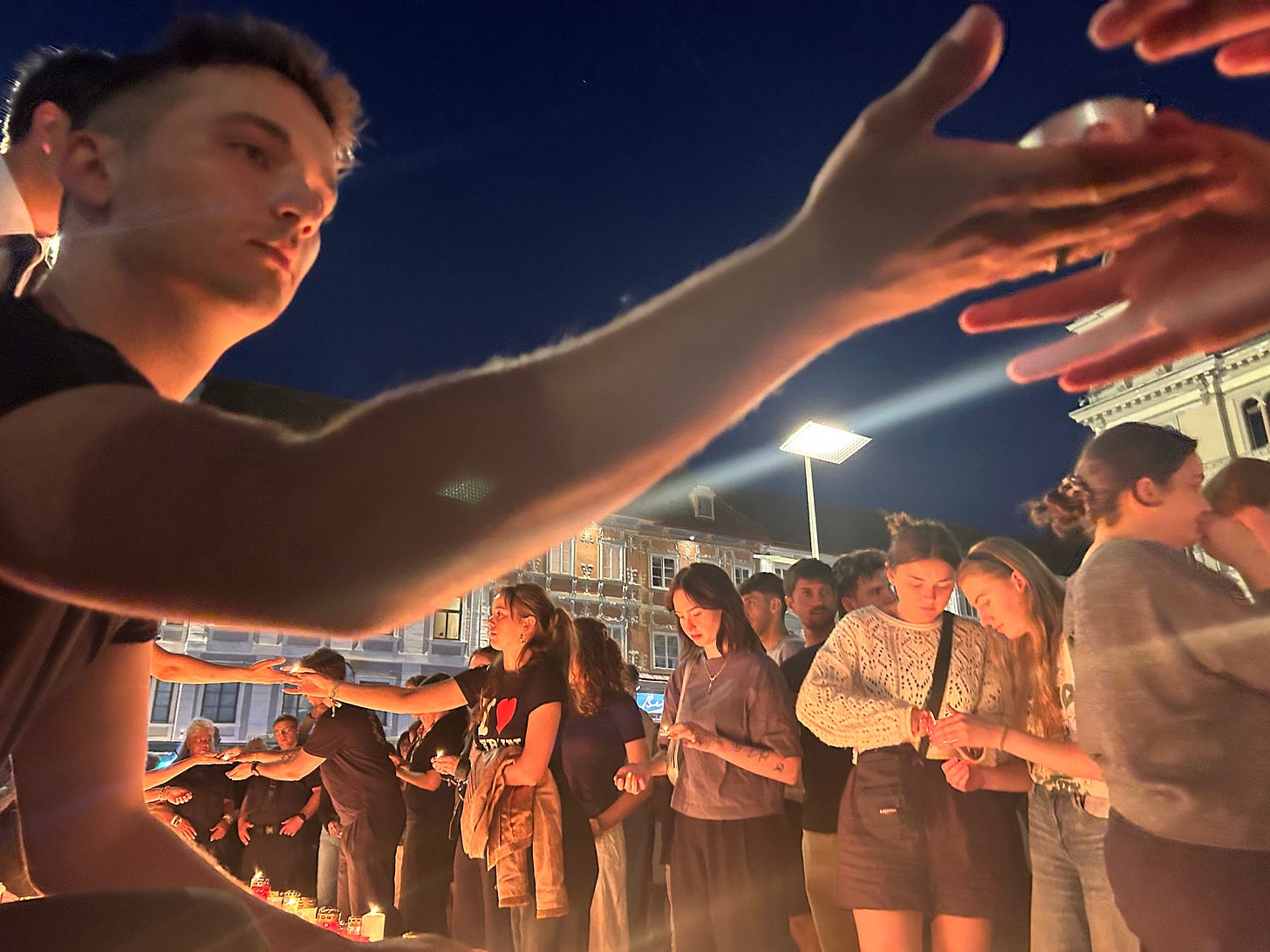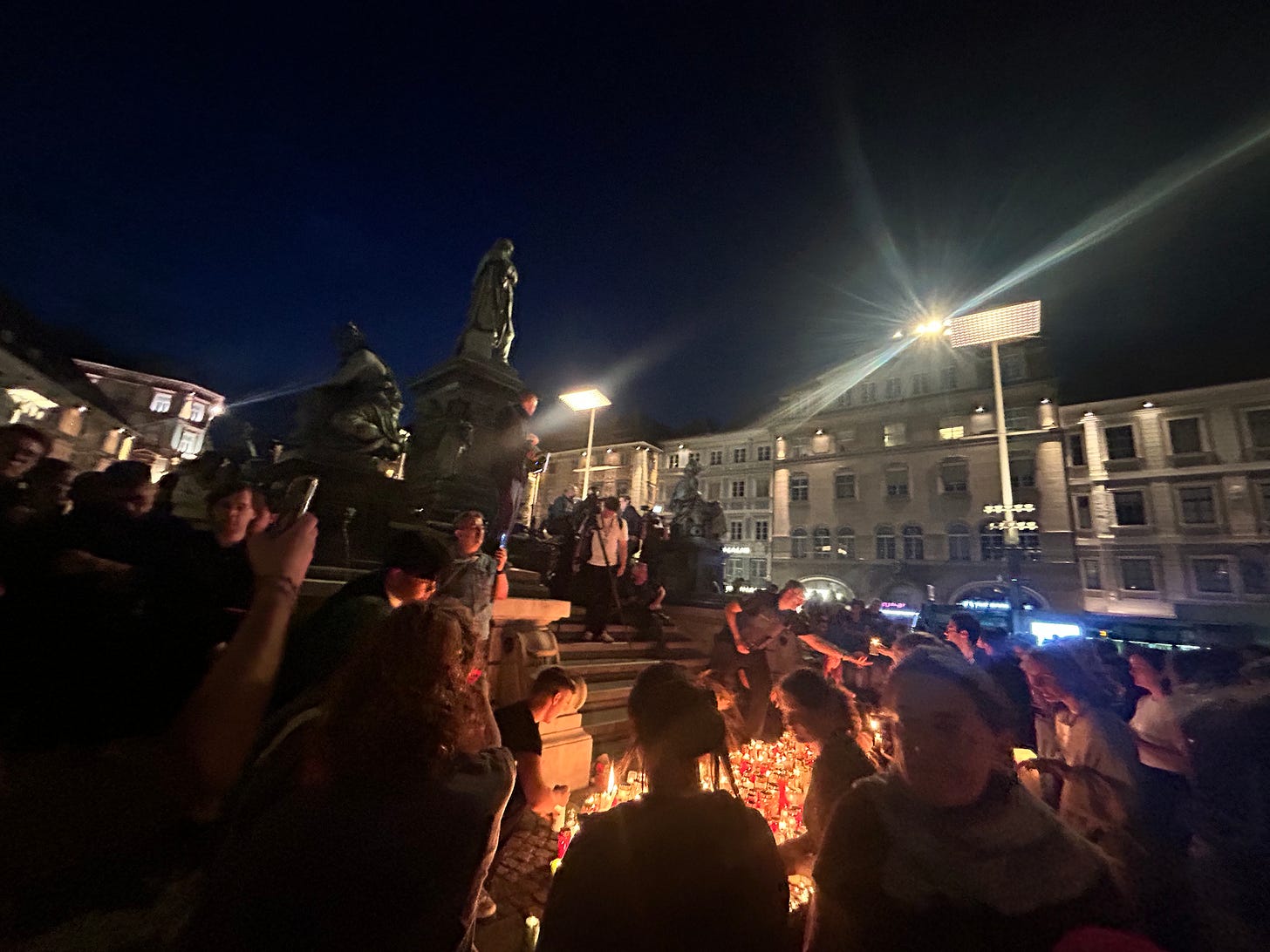The Graz effect
on guns, grief and human goodness
I’ve just spent 2 days in Graz, Austria’s second city, covering the worst mass-shooting in the country’s recent history. Nine random pupils, six girls and three boys, aged 14 to 17, were killed by Arthur A., a 21 year old former student, walking from classroom to classroom, opening fire with a Glock 19 semi-automatic pistol.
With my BBC colleagues, I’ve already written at length about the tragic events, for example here. But in this post, I’d like to dwell on the astonishing dignity and mutual support I witnessed in the city this week, especially among those most affected, the youth.
I’ll also include an interview with a gun seller.
The Hauptplatz in Graz, 10 June 2025, 10 pm on the evening of the shooting
What sound do candles make? In the Balkans, the tall thin yellow tapers you light inside or outside Orthodox churches, for the living or the dead, make a pleasant crackling sound, thanks to the imperfections, the drops of water in the beeswax. In Graz, the night-lights, the tall white candles and short stubby ones, made no sound. The hot wax ran between the fingers of the students, down their wrists, like the tears on their faces.
The candles were arranged in a growing lake of light on the steps of the Archduke Johann fountain, as darkness fell on Tuesday. Young people gathered, lit their candles, and stood awhile in the square. Then they brought them forward, and handed them over the candle-lake to volunteers on the far side, who arranged them. All of this was done without words.
Some of the candles were in the red jars used in cemeteries, to protect them from the wind and rain. But there was no wind or rain in Graz that evening, just the whispering of the young on a hot, still summer’s night. Some came alone, others with friends. Everyone knew what to do. Perhaps the young understand death better than the old, despite the reluctance in our fun-focussed societies to discuss it. Despite the narcissism of the young, and their concern for safety and certainty.
Then the bells of the cathedral struck ten - exactly twelve hours after the shooting occurred. You can listen to them here:
.
The sound of water is from the fountain, which is named after Archduke John of Austria (Erzherzog Johann von Österreich). Johann had a reputation as a ‘man of the people’, who wearied of his life as a military commander in the Napoleonic wars, and dedicated the rest of his life to the people of Styria, including projects to irrigate the fields. He was a keen mountaineer, and a mountain shelter in the Eastern Alps, and even an orchid are named after him -(Nigritella rubra subspecies: archiducis-joannis).
As a statue, Johann looks towards the Schlossberg hill. He is surrounded by four female figures, representing the four rivers of Styria, the Mur, Enns, Drau and Sann.
On Tuesday night in Graz, we all turned to stone - the cameramen and camerawomen on the steps, their cameras frozen to their shoulders, the crowd in the square, the doctors and nurses in the hospitals, the mourning brothers and sisters, mothers and fathers, the friends of the lost pupils.
That’s what bullets do. They kill time.
On Wednesday I went round the gunshops of Graz, to find out how to buy a semi-automatic weapon. At the school, the gunman fired at least 30 shots, a neighbour told me. The equivalent of two magazines (2 x 15) of the Glock 19 pistol used in his attack. Glocks are the pistol of choice of the Austrian police, and many other armed forces, and are made at Deutsch-Wagram in Lower Austria, at a company founded by Gaston Glock (1929-2023).
In response to the school shooting, Elke Kahr, the 63 year old Communist mayor (yes, Graz has a Communist mayor) called for a ban on the private possession of weapons - a bold proposal, in a country where there are 30 guns for every 100 citizens, according to the Small Arms Survey of 2018. That puts Austria 12th in the world for the number of guns per capita - near the top in Europe, but far behind the United States, with 120 firearms per 100 people.
Arthur A. legally owned the Glock and a shotgun, which he bought after he tried and failed to make a pipe-bomb. He applied to join the army after he left school without a qualification. He failed the psychological entry examination, on the grounds that he was ‘overly introverted’ To become the private owner of a pistol or any repeating weapon, you need to undergo a 90 minute psychological test with a private practitioner. One psychologist in Graz advertises the cost of that as €237. That one he passed.
According to the tabloid Kronen Zeitung, he had a sleep problem, staying up half the night playing video games the aim of which is to shoot as many people as possible. ‘There he learned how to shoot doors open and execute "opponents". He then perfected this through weeks of training with real guns on the shooting range.’
A teacher saw him use the shotgun to shoot open the door of the second classroom, which the pupils inside had tried to block
In one gun shop, the owner spoke to me on condition of anonymity.
‘It’s not the laxity of our gun laws that let this happen, but our broken society, and our broken politics’ he told me. ‘Look at Germany - they have stricter gun laws than we do, and look what happens - they drive cars into crowds!’
You can go into his shop and buy a shotgun, he says, but only after a 3 day ‘cooling off’ period. You provide your name and identity documents, and the shop assistant sends these to the police, for a check. If no reasons are found for refusal, you can come back and buy the gun 3 days later. The police do turn down many applications, he said. But Arthur A. was not on the police radar, and the army don’t share their data, if someone fails the entry exam.
For pistols and other, semi-automatic the procedure is ‘much longer and more complicated’ he explained. The cornerstone is the psychological test.
You also have to convincingly explain your purpose in owning a weapon. One reason given by many is sport. Arthur A. joined a shooting club and practiced for weeks on a firing range, before he attacked his former school.
‘We cannot stop things like this with laws’, the gunshop owner insists. ‘Everything about this guy was illegal. He would have found a way, whatever laws are in force.’
A photograph of the perpetrator, holding a cat, shows a narrow faced, troubled looking child, hardly a young man, with tousled straw-coloured hair, and staring eyes.
His Armenian father abandoned the family. He was brought up alone by his mum.
Opinion surveys sometimes ask who would be willing to die for their country, and the older people shake their heads in disapproval, as the low numbers are published. Perhaps someone should do a survey on how many people would be willing to weep for their country. The figures in Graz this week, would have been in the high 90s. Until 10 June, Arthur A. would probably have been one of them.





